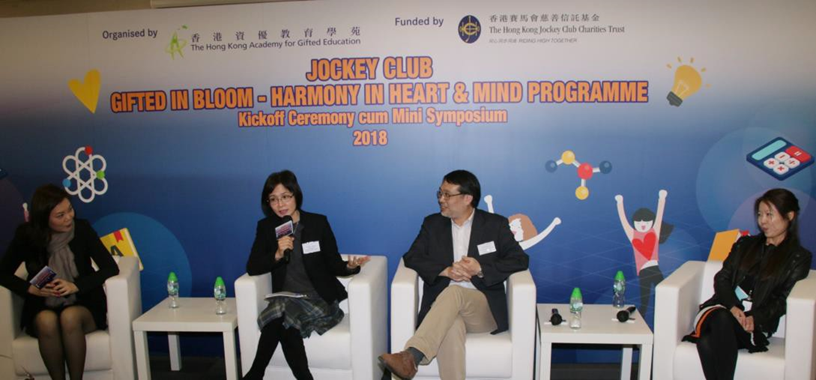"Affective Education" Facilitates Gifted Students to Shine
(Hong Kong – 12 March 2018) Most of the gifted students have higher intelligence and creativity. However, due to their unique characters and self-demanding personalities, they may also encounter emotional and behavioural problems. Some studies show that the more excellent the gifted students are, the more difficult for them to manage their emotions and have successful interpersonal relationships.
Seeing the growing needs of affective education for the development of gifted children with intellectual achievements, The Hong Kong Academy for Gifted Education (HKAGE) wants to empower them to achieve self-actualisation, demonstrate their best and utilise their unique talent to contribute to the society. In recent years, HKAGE has actively promoted affection education to foster gifted students’ whole-person development and unleash their potential. Earlier on, HKAGE has been funded by The Hong Kong Jockey Club Charities Trust with over HK$21 million to launch a three-year Jockey Club “Gifted in Bloom – Harmony in Heart & Mind” Programme.
Today, the officiating guests, Dr Choi Yuk Lin, JP, Under Secretary for Education, Education Bureau and Ms Winnie Ying, Head of Charities (Grant Making – Youth, Education & Training, Poverty) of The Hong Kong Jockey Club delivered their opening addresses respectively. Prof. Ng Tai Kai, Executive Director, HKAGE introduces Jockey Club “Gifted in Bloom – Harmony in Heart & Mind” Programme, Prof. Jonathan Plucker, Julian C. Stanley Professor of Talent Development, School of Education, Johns Hopkins University, Center for Talented Youth shared on “Social and Emotional Development of Gifted Students: Recent Advances and Needed Research”. Two panel discussions held: "Affective Education for Teachers and Parents" and "Affective Education Programmes for Students". (Please refer to table 1).
Ms Winnie Ying, Head of Charities (Grant Making – Youth, Education & Training, Poverty) of The Hong Kong Jockey Club said, “The Club is one of the world's top ten charity donors and committed to help the development of local children. We are delighted to support this new project designed to generate an evidence-based affective education curriculum for exceptionally gifted learners. It is expected to benefit around 3,500 students, 1,900 parents and 2,000 teachers. We will continue to collaborate with different sectors to seek further ways of contributing to the development of the city’s children.”
Prof. Ng Tai Kai, Executive Director, HKAGE said, “Thank you for attending today's event and I would like this opportunity to thank the Jockey Club for their generous donation. The Jockey Club “Gifted in Bloom – Harmony in Heart & Mind” Programme is the first of its kind in the Hong Kong gifted education landscape. The aim of this progrmme is to optimise the current affective education curriculum of HKAGE, and introduce the importance of affective education to parents, teachers and the public. In the long run, to establish a preliminary framework of affective education and provide professional training for parents and educators”.
Affective Education Cases
Case 1)
Raising a gifted child, can be a joyful yet worrying experience. Angela's 12-year-old son Sean, is a highly sensitive boy and has a special thinking mode that is always geared up for problem solving. While studying in kindergarten, Sean’s cognitive development had already become more precocious than that of his peers. When other students were engaging in Chinese zodiac animal project, he had already conducted a research on “Fasciitis” and hopefully found a remedy for his mum who had suffered from fasciitis. With such a smart and caring son, Angela should be gratified, but Sean, a passionate thinker, keens to challenge the authority, especially the existing education system. Angela said, "He loves to challenge teachers and challenge school curriculums, of course, including me, who is also serving in the education field." Therefore, Angela is constantly under tension with her son, and her emotions are inevitably out of control, so Sean strikes back by saying, "Mum, you are going nuts again". Angela recalled that she was particularly fortunate to have the opportunity to attend the affective education parenting programmes so that she can be able to understand the uniqueness of gifted children. Angela observed that gifted kids are seeing things from different angles and have enthusiasm in their own ways, it reminds her that when she deals with her son, she must keep calm, manage her emotions, especially when "menopause" encounters "adolescence" in the near future.
Case 2)
Duncan, 11-year-old, Judy’s son is also a young boy with sharp mind and creative ideas. As a kid, he cares for the accidental loss of elders in the community, he worked diligently with his classmates and figured out in what ways they can help. Finally, they came up with an idea of developing a free mobile app to help identifying the location of those elderly users and prevent them from getting lost. It turns out that their creativity brought them awards. However, Duncan with exceptionally high IQs has his shortcomings as well. Judy pointed out that the biggest problem with his son is that he does not know how to manage his emotions. Whenever in the scenarios of taking homework assignments or playing games, in case of the related participants failed to meet the rules pre-set by him and respond the ways he expected, he would lose temper and was mad like a "Tyrannosaurus". Apparently, Duncan is falling short on empathy and does not know how to resolve conflicts by other means. Judy attended the parenting programmes of affective education. The instructor helped her better understand the personal traits of her son and taught her how to relax. Now Judy will not argue with Duncan, even when she faces her "impetuous" son. She will leave the scene first, go to the bathroom to wash her face, or go to the kitchen for a glass of water then calm down and talk to him. In addition, with the support and encouragement of other parent members, she no longer feels lonely. Like Angela, Judy thinks affective education programmes play a positive role in reforming her attitudes towards raising Duncan, help to ease the tensions on parenting and encourage her son to develop his unique potential.
Jockey Club “Gifted in Bloom – Harmony in Heart & Mind” Programme Funded by The Hong Kong Jockey Club Charities Trust, the Programme was launched in December 2017 with the aim of optimising the current affective education curriculum for the Hong Kong Academy for Gifted Education (HKAGE), introducing the importance of affective education to students, schools and the public, and establishing a preliminary framework of affective education for parents and educators via professional training. |
Table 1
Affective Education for Teachers and Parents (15:15 to 16:00) | Affective Education Programmes for Students (16:00 to 16:50) |
Speakers: 1) Dr Ricci W. Fong, Assistant Professor, Department of Curriculum and Instruction, The Education University of Hong Kong 2) Mr Simeon Brodsky, Director, International Initiatives, Johns Hopkins Center for Talented Youth 3) Ms Tiffany Sin, Programme Manager, Affective Education Division, HKAGE Facilitator: Ms Melanie Cheung, Head, Affective EducationDivision, HKAGE | Speakers: 1) Dr Lai Kwan CHAN, Program Director, Program for the Gifted & Talented, The Chinese University of Hong Kong 2) Prof. King Chow, Director, The Center for the Development of the Gifted and Talented, Hong Kong University of Science and Technology 3) Ms Shirley Kwok, Head, Advanced Learning Experiences Division, HKAGE Facilitator: Ms Emily Lily Ngai, Researcher, Jockey Club “Gifted in Bloom – Harmony in Heart & Mind” Programme |
- End -
Caption:
1) The ceremony was kick-started by all the officiating guests of Jockey Club “Gifted in Bloom – Harmony in Heart & Mind” Programme.
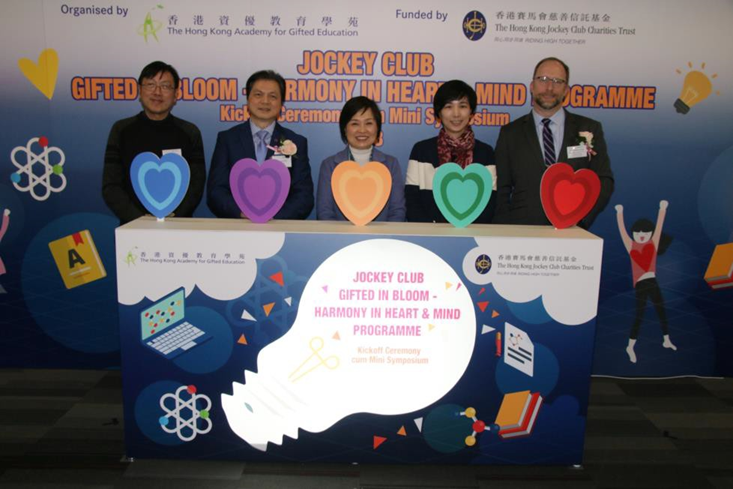
2) Dr Choi Yuk Lin, JP. Under Secretary for Education, Education Bureau delivers her opening address.
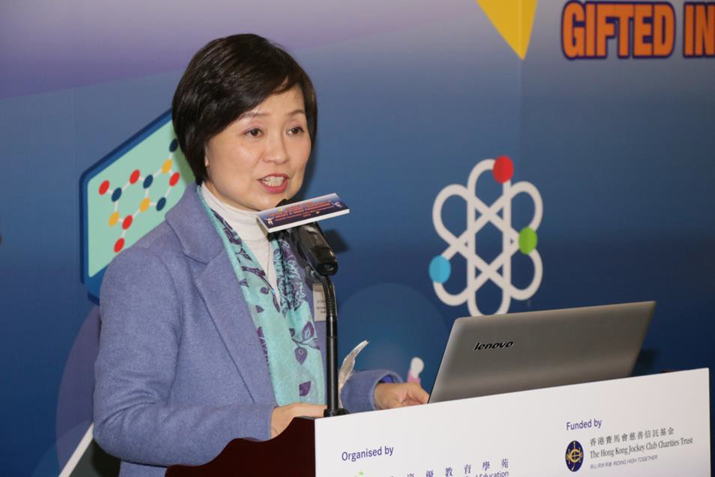
3) Ms Winnie Ying, Head of Charities (Grant Making – Youth, Education & Training, Poverty) of The Hong Kong Jockey Club delivers her opening address.
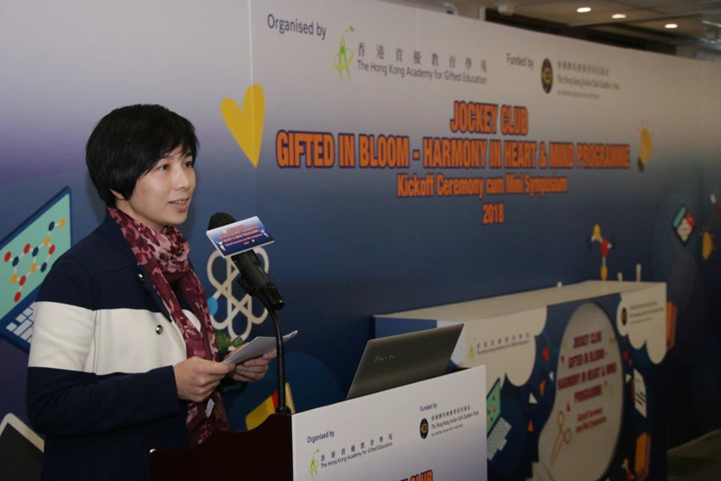
4) Prof. Ng Tai Kai, Executive Director, HKAGE introduces Jockey Club “Gifted in Bloom – Harmony in Heart & Mind” Programme.
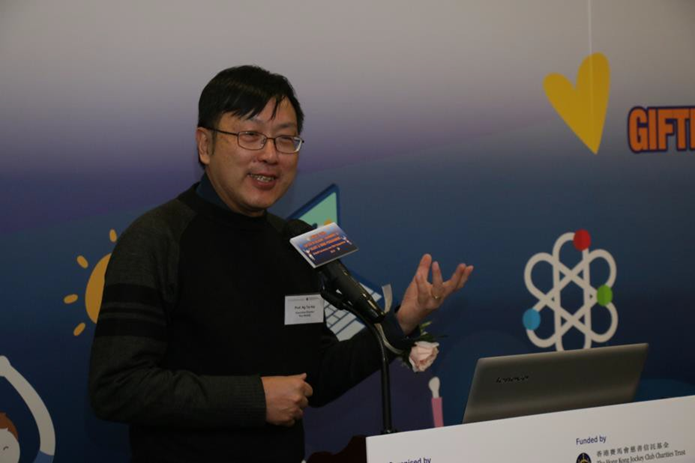
5) Prof. Jonathan Plucker, Julian C. Stanley Professor of Talent Development, School of Education, Johns Hopkins University, Center for Talented Youth shares on “Social and Emotional Development of Gifted Students: Recent Advances and Needed Research”.
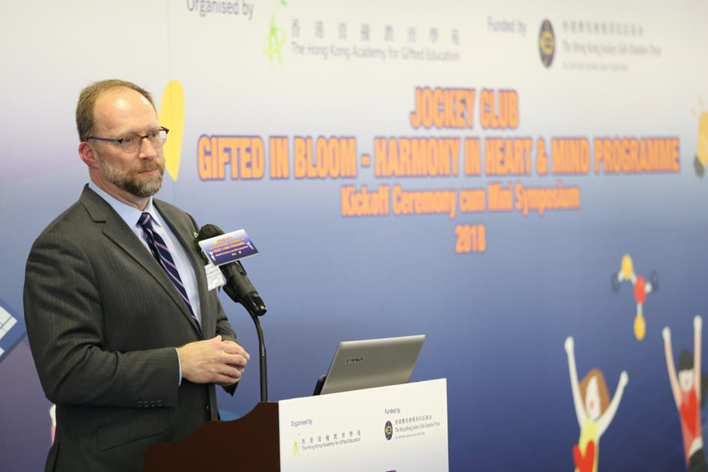
6) Affective Education for Teachers and Parents’ panel discussion.
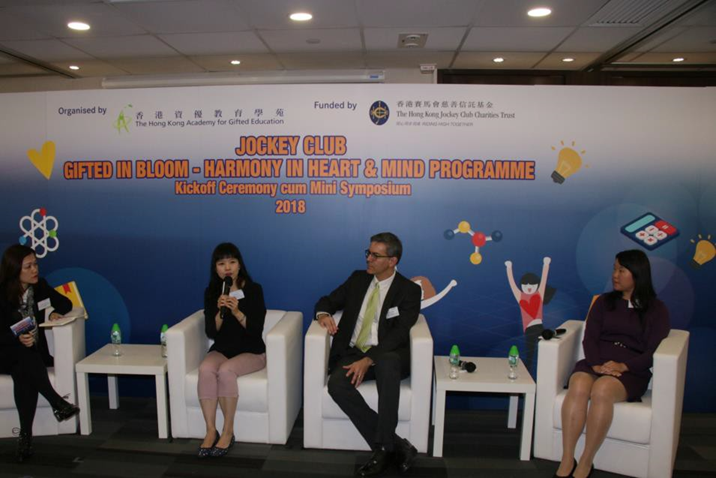
7) Affective Education Programmes for Students’ panel discussion.
